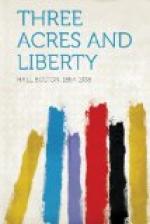Chapter I: Making a Living—Where and How
Chapter II: Present Conditions
Chapter III: How To Buy The Farm
Chapter iv: Vacant City Lot Cultivation
Chapter V: Results To Be Expected
Chapter VI: What An Acre May Produce
Chapter VII: Some Methods
Chapter VIII: The Kitchen Garden
Chapter IX: Tools And Equipment
Chapter X: Advantages From Capital
Chapter XI: Hotbeds And Greenhouses
Chapter XII: Other Uses Of Land
Chapter XIII: Fruits
Chapter XIV: Flowers
Chapter XV: Drug Plants
Chapter XVI: Novel Live Stock
Chapter XVII: Where To Go
Chapter XVIII: Clearing The Land
Chapter XIX: How To Build
Chapter XX: Back To The Land
Chapter XXI: Coming Profession For Boys
Chapter XXII: The Wood Lot
Chapter XXIII: Some Practical Experiments
Chapter XXIV: Some Experimental Foods
Chapter XXV: Dried Truck
Chapter XXVI: Home Cold Pack Canning
Chapter XXVII: Retail Cooperation
Chapter XXVIII: Summer Colonies For City People
CHAPTER I
MAKING A LIVING—WHERE AND HOW
By thought and courage, we can help ourselves to own a home, surrounded by acres of fruit and vegetables, flowers and poultry, and learn the best methods so as to insure success.
In olden times any one could “farm,” but it is necessary to-day to teach people to obtain a livelihood directly from the earth. Scientific methods of agriculture have revealed possibilities in the soil that make farming the most fascinating occupation known to man. People in every city are longing for the freedom of country life, yet hesitate to enter into its liberty because no one points the way.
Most sociologists are agreed that the great problem of our day is to stop the drift of population toward the cities. Seeing the overcrowding, the want and misery of our great towns, the philanthropist chimes in with “Get the people to the country, that is the need.”
But there is no such need. Man is a social animal, he naturally goes in flocks, he earns more and learns more in crowds. To transport him to the country, even if he would stay, which happily he won’t, would be to doctor a symptom. As in typhoid, what is needed is not to suppress the fever, that is easy, but to remove the cause of it.
It is not the growth of the cities that we want to check, but the needless want and misery in the cities, and this can be done by restoring the natural condition of living, and among other things, by showing that it is easier and making it more attractive to live in comfort on the outskirts of the city as producers, than in the slums as paupers.




